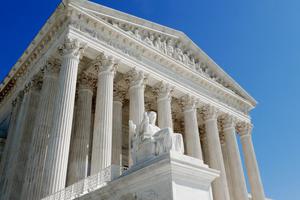Mississippi Attorney General Asks Supreme Court to Overturn Abortion Rulings Including ‘Roe v. Wade’
Fitch, in her brief, said that Mississippi is “simply asking the Court to affirm the right of the people to protect their legitimate interests and to provide clarity on how they may do so.”

JACKSON, Miss. — Mississippi Attorney General Lynn Fitch on Thursday asked the Supreme Court to overturn two of its landmark rulings on abortion, arguing those decisions “shackle states to a view of the facts that is decades out of date.”
The high court recently agreed to hear the case of Dobbs v. Jackson Women’s Health Organization, involving Mississippi’s ban on most elective abortions after 15 weeks. Activists on both sides of the abortion debate have argued that the case might prompt the court to re-examine its 1973 ruling in Roe v. Wade that legalized abortion nationwide, as well as its 1992 decision in Planned Parenthood v. Casey that built upon the Roe ruling.
The high court is expected to hear the Dobbs case in the fall. In a brief filed with the Supreme Court on Thursday, Fitch said that the Roe and Casey rulings created more questions than answers, and that the issue of abortion should be returned to lawmakers rather than to the courts.
Fitch said that rather than settling debate over the issue of abortion, the Roe and Casey decisions established “a special-rules regime for abortion jurisprudence that has left these cases out of step with other Court decisions and neutral principles of law applied by the Court.”
“As a result, state legislatures, and the people they represent, have lacked clarity in passing laws to protect legitimate public interests, and artificial guideposts have stunted important public debate on how we, as a society, care for the dignity of women and their children,” Fitch said.
“It is time for the Court to set this right and return this political debate to the political branches of government,” she wrote.
Jeanne Mancini, president of March for Life, praised Mississippi’s brief in a statement, arguing that “updating America’s abortion jurisprudence is necessary and long overdue.”
“The law at issue before the Supreme Court concerns moderate limits on the abortion of a child who has developed past 15 weeks, with a fully formed nose and lips, eyelids and eyebrows – when her humanity is beyond debate,” Mancini said. “Limiting gruesome late term abortions is compassionate and popular; and the norm in countries that have allowed their laws to catch up with the science.”
Mancini argued that most nations restrict elective abortions at an earlier point in a pregnancy than the United States does.
“Sadly, right now, the United States is one of only seven countries – including North Korea and China - that allow elective abortion after 20 weeks of pregnancy," she said.
In a statement, NARAL Pro-Choice America Acting President Adrienne Kimmell said Mississippi “is explicitly seeking to end the constitutional right to abortion and subvert the will of the overwhelming majority of Americans who support Roe and the legal right to abortion.”
“This has always been the anti-choice movement’s agenda behind closed doors—now they’re operating in plain sight,” Kimmell said.
Fitch, in her brief, said that Mississippi is “simply asking the Court to affirm the right of the people to protect their legitimate interests and to provide clarity on how they may do so.”
She further argued that major societal changes since 1973 have made the Roe decision worth examining.
“A lot has changed in five decades,” Fitch said. “In 1973, there was little support for women who wanted a full family life and a successful career. Maternity leave was rare. Paternity leave was unheard of. The gold standard for professional success was a 9-to-5 with a corner office. The flexibility of the gig economy was a fairy tale. In these last fifty years, women have carved their own way to achieving a better balance for success in their professional and personal lives.”
“By returning the matter of abortion policy to state legislatures, we allow a stunted debate on how we support women to flourish,” Fitch continued. “It is time for the Court to let go of its hold on this important debate.”
- Keywords:
- abortion in mississippi
- supreme court
- Dobbs v. Jackson Women’s Health Organization
- roe v wade
















